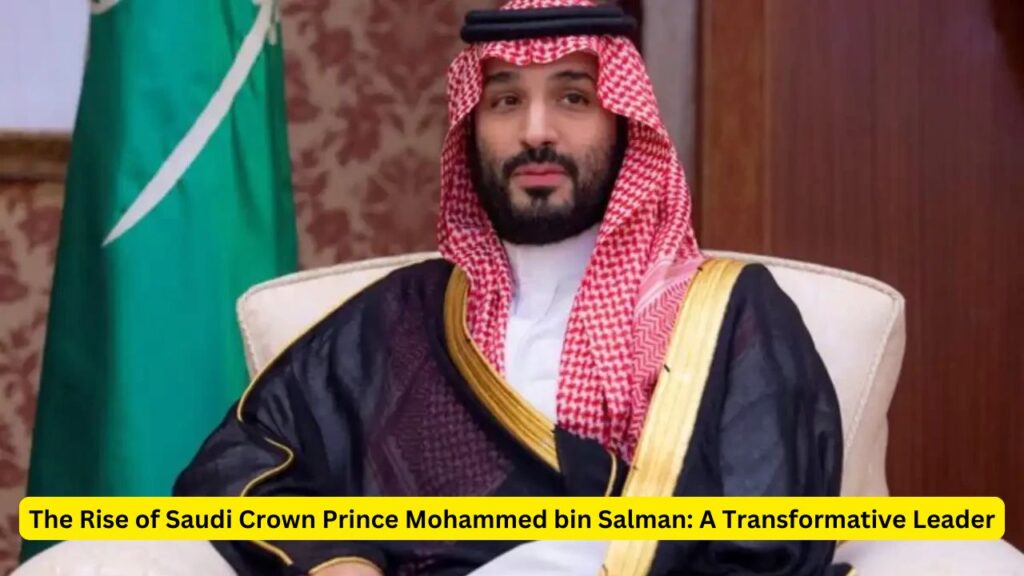
Saudi Arabia’s Crown Prince Mohammed bin Salman (often referred to as MBS) represents a new chapter in the kingdom’s modern history. Since his appointment as Crown Prince in June 2017, MBS has been at the forefront of sweeping reforms aimed at transforming Saudi Arabia’s economy, society, and geopolitical strategy. His vision is ambitious and controversial, and his leadership style has both supporters and critics around the world.
Vision 2030: A Bold Economic Overhaul
One of the most significant aspects of Mohammed bin Salman’s leadership is his Vision 2030 plan, an extensive economic reform initiative launched in April 2016. The vision aims to reduce Saudi Arabia’s dependency on oil, diversify its economy, and develop public service sectors such as health, education, and infrastructure. This plan seeks to transform the kingdom into a global investment powerhouse and a vibrant society, less reliant on its traditional oil revenues.
Central to Vision 2030 is the plan to privatize Saudi Aramco, the state-owned oil giant, which is one of the world’s largest and most valuable companies. The initial public offering (IPO) of a portion of Aramco in late 2019 was a landmark event, generating substantial interest and raising billions of dollars. The proceeds are intended to fund various projects and investments outlined in Vision 2030.
Social Reforms: A Modernizing Agenda
Under MBS, Saudi Arabia has also embarked on a series of social reforms aimed at modernizing the kingdom’s conservative social norms. Women’s rights have seen notable advancements, with women gaining the right to drive in 2018 and increased participation in the workforce. These changes are part of a broader effort to open up the society and enhance the quality of life for Saudis, aligning with the goals of Vision 2030.
Cultural and recreational opportunities have also expanded. The kingdom has begun to host major international events, including music concerts, film festivals, and sporting events, which were previously rare. These initiatives are intended to foster a more open and diverse cultural landscape, appealing to both Saudis and international visitors.
Geopolitical Ambitions: A New Regional Strategy
On the geopolitical front, Crown Prince Mohammed bin Salman has pursued an assertive foreign policy aimed at strengthening Saudi Arabia’s influence in the Middle East and beyond. His leadership has seen the kingdom take a more proactive role in regional conflicts and diplomatic efforts. The Saudi-led coalition’s intervention in Yemen, which began in 2015, is a notable example of this assertiveness, although it has also drawn significant international criticism due to the humanitarian impact of the conflict.
MBS has also worked to counter the influence of Iran, a key regional rival, and to build stronger ties with Western nations, particularly the United States. His efforts to build alliances and attract foreign investment reflect a strategic approach to enhancing Saudi Arabia’s global standing and economic prospects.
Controversies and Challenges
Despite his ambitious vision and transformative efforts, Mohammed bin Salman’s tenure has not been without controversy. His leadership has faced criticism over human rights issues, including the crackdown on dissent and the murder of journalist Jamal Khashoggi in 2018, which has led to significant international scrutiny and condemnation. The handling of the Khashoggi case, in particular, has strained relations with some Western countries and raised questions about Saudi Arabia’s commitment to reform.
Additionally, the economic and social reforms, while groundbreaking, face challenges in implementation. The success of Vision 2030 depends on navigating both domestic resistance to rapid change and global economic fluctuations. The kingdom’s efforts to diversify its economy and modernize its society will require careful management of these complexities.
Conclusion
Crown Prince Mohammed bin Salman stands at the helm of a transformative era in Saudi Arabia’s history. His leadership reflects a mix of bold ambition, economic innovation, and social reform. While his approach has brought significant changes and opportunities to the kingdom, it has also encountered criticism and challenges. As Saudi Arabia continues to evolve under MBS’s leadership, the world will be watching closely to see how his vision unfolds and impacts both the kingdom and the broader global community.
FAQ
1. Who is Crown Prince Mohammed bin Salman?
Crown Prince Mohammed bin Salman, commonly known as MBS, is the current Crown Prince of Saudi Arabia, having been appointed in June 2017. He is the son of King Salman bin Abdulaziz Al Saud and is known for his ambitious Vision 2030 plan aimed at transforming Saudi Arabia’s economy and society.
2. What is Vision 2030?
Vision 2030 is a comprehensive reform plan launched by MBS in April 2016. It aims to reduce Saudi Arabia’s reliance on oil, diversify the economy, and enhance public services such as health, education, and infrastructure. The plan includes privatizing parts of Saudi Aramco and investing in various sectors to create a more sustainable and diversified economy.
3. What are some key components of Vision 2030?
Key components of Vision 2030 include:
Economic Diversification: Reducing dependence on oil by investing in sectors like tourism, entertainment, and technology.
Saudi Aramco IPO: Partially privatizing the state-owned oil company to raise funds for investment in other areas.
Social Reforms: Enhancing women’s rights, expanding cultural and recreational opportunities, and improving quality of life.
4. What social reforms has MBS implemented?
Under MBS’s leadership, Saudi Arabia has seen several significant social reforms, including:
Women’s Rights: Women were granted the right to drive in 2018 and have increased participation in the workforce.
Cultural and Recreational Opportunities: The kingdom has started hosting international events, such as music concerts and film festivals, which were previously rare.
5. How has MBS approached foreign policy?
MBS has pursued an assertive foreign policy to strengthen Saudi Arabia’s influence. This includes:
Regional Conflicts: Leading a coalition in Yemen and countering Iran’s regional influence.
International Relations: Building stronger ties with Western countries and attracting foreign investment to enhance Saudi Arabia’s global standing.